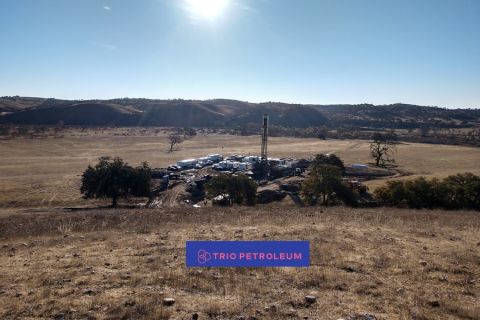Now come darker days for oil and gas mezzanine finance, with the closing of Shell Capital Inc. The shuttering follows the demise of Enron Energy Capital Resources and the recent pull-back-some of it real, some of it perceived-in new transactions by financiers whose deregulated-utility parents are focusing on their own balance sheets presently. "We're going to see a genuine shortfall of capital in the mezzanine market, and we're a big user of mezzanine capital," says Osprey Petroleum Co. executive vice president Rick Bobigian. The Houston-based independent, formed in 1999, closed its initial mezzanine investment of $28.4 million from Aquila Energy Capital Corp. in March 2001, and it has done several facility expansions with Aquila, since then. Osprey plans to again expand its credit facility by this summer. "These are days of concern, for us, as everyone will be knocking on Aquila's door," Bobigian says. "On the other hand, good projects always get funded." The Royal Dutch/Shell Group of Cos. announced the closing of Houston-based producer-finance business unit Shell Capital in March. Most players in the Houston energy-finance business were surprised. The four-year-old Shell Capital had already placed more than $500 million, and showed promise to invest a great deal more. Meanwhile, many Shell Capital staff members were stunned. Shell reported that Shell Capital, Shell Internet Works and Shell Consumer would be merged under the Shell Consumer title. The news came later that Shell Capital would simply be closed. "All of the businesses have achieved successes in developing their own skills and capabilities and marketing new products and services. Shell has now decided that it is time to consolidate these new businesses," the company said. "In doing so, the aim is to refocus resources and management attention on those activities that have demonstrated the best prospects of delivering sustained value growth, closest to Shell's core businesses and capabilities." The company has been increasing its own debt. Three huge deals-the acquisitions of downstream businesses Motiva and Equilon, motor-oil business Pennzoil-Quaker State, and E&P company Enterprise Oil-are expected to raise Shell's debt-to-capitalization ratio to 20% by year-end, according to Moody's Investors Service. The figure is in contrast to a nearly $7 billion cash surplus at year-end 2001. Shell Capital producer-finance co-head Michael Keener and a few other staff members will remain with the business unit for six to 18 months-as long as it takes to divest the Shell Capital assets, which include producer-finance as well as commercial-finance accounts. A dataroom on the accounts will be opened shortly. Ben M. (Bud) Brigham, chairman, president and chief executive of Austin-based Brigham Exploration Co., says, "Shell Capital was somewhat unusual in that they were not exploration-risk-averse. Many capital providers are focused, and skilled at, investing in E&P companies that focus on the acquire-and-exploit strategy. Shell had knowledge and expertise that enabled it to invest in exploration companies such as ours." Brigham Exploration presently has a $75-million senior credit facility, in which Shell Capital has a $40-million position. The company also has a $20-million subordinated-debt account with Shell Capital. Cameron Smith, a managing director of New York City-based Cosco Capital Management LLC, which matches E&P capital-seekers with capital providers, says the loss of Shell Capital from the mezzanine-investment space comes at an already tough time. Enron ECR is closed, and Mirant Americas Energy Capital LP isn't doing much new business right now. Pam Pierce, president and chief executive of the Mirant finance unit, says the firm is continuing to look for new mezzanine debt opportunities, and had a new deal up for approval at press time. "We are being very selective with regard to new transactions, but we are continuing to pursue them," she says. Smith says other major players are Duke Capital Partners, Aquila Energy Capital Corp. and Trust Company of the West (TCW), which is placing $500 million in energy right now through its TCW Global Project Fund Ltd. Also at the table from time to time are Cargill, Range Resources Corp.'s producer-finance business unit and Wells Fargo Energy Capital. With fewer players, will the cost of mezzanine capital go up? Smith says, "In the classic theory of supply and demand, yes. I'm more concerned, however, that for a while at least, mezzanine capital will simply be much more difficult to find." Private-equity capital, on the other hand, is currently available in abundance, but "there's nothing more expensive than private equity-or equity, in general," he notes. Tim Murray, president of Wells Fargo Energy Capital, says Shell Capital's closing is a loss. "Mezzanine capital is particularly important in today's market, where small and midcap E&P companies are out of favor in the public debt and equity markets." The cost of mezzanine capital will go up, he says. For example, overrides will be higher. Scott Johnson, a co-founder of Houston-based Weisser Johnson & Co. investment-banking advisory firm, met often with Shell Capital, as well as TCW, Mirant and Enron ECR. "The mezzanine-financing market for oil and gas has always been highly concentrated among a few large and very active players," Johnson says. "The core market of mezzanine investors has been decimated since the beginning of the year. Of five key mezzanine investors last year, only two are left." The most active participant at the table now is Duke Capital, he says. "The mezzanine financing business has certainly been hurt. The remaining investors will be much more selective than ever before, so companies will need to present strong projects and they will need to present them well," Johnson says. Keener has been with Shell for more than 20 years-all of them in exploration and production, and several of them in the Shell E&P mergers and acquisitions department. Clint Wetmore, a Shell Capital vice president, has already taken a position with Shell's in-house mergers and acquisitions team, based in Houston. Shell has said it plans to offer all staff members a position within the company. Brigham Exploration will be less affected by the loss, its CEO says. "We've grown our cash flow such that we can grow organically. We're not dependent on accessing additional external capital. It's more likely that our next transaction will include conventional senior debt, and at some point public equity." Shell Capital made investments of $10- to $100 million, but stepping up to the under-$5-million plate is BlackRock Capital Energy Capital Ltd. The Houston-based firm is newly formed by three former Range Resources producer-finance directors: Cathy Sliva, Dave Stevens and Scott Abel. The partners hope to place $200 million during the next five years. Stevens, who has been in producer finance since 1983, says of Shell Capital, "I have a lot of respect for those guys. They've done some really good deals. They were the leading mezzanine lender in the $10-million-and-above category." Osprey Petroleum's Bobigian expects a new entrant will take Shell Capital's place. Smith, at Cosco Capital Management, agrees. For example, insurance companies are presently seeking to invest in this sector. (For more on this, see "Cash Flows" in this issue.) "We're also seeing a marked increase in interest in energy by investors without a prior history of energy investment," Smith says. "Most of them are inclined to invest in the mezzanine space, with a specific yield component and dedicated assets. They think it's safer than straight common." And the present players who remain at the table will probably increase their roles, he adds. Whichever one buys the Shell accounts will step up their portfolio at least by that much. Meanwhile, one industry veteran says, "We still think Shell should be in this business. It won't surprise me if it ends up in the business again."
Recommended Reading
E&P Highlights: March 11, 2024
2024-03-11 - Here’s a roundup of the latest E&P headlines, including a new bid round offshore Bangladesh and new contract awards.
Sinopec Brings West Sichuan Gas Field Onstream
2024-03-14 - The 100 Bcm sour gas onshore field, West Sichuan Gas Field, is expected to produce 2 Bcm per year.
Trio Petroleum to Increase Monterey County Oil Production
2024-04-15 - Trio Petroleum’s HH-1 well in McCool Ranch and the HV-3A well in the Presidents Field collectively produce about 75 bbl/d.
E&P Highlights: March 15, 2024
2024-03-15 - Here’s a roundup of the latest E&P headlines, including a new discovery and offshore contract awards.
US Drillers Cut Oil, Gas Rigs for Second Time in Three Weeks
2024-02-16 - Baker Hughes said U.S. oil rigs fell two to 497 this week, while gas rigs were unchanged at 121.




